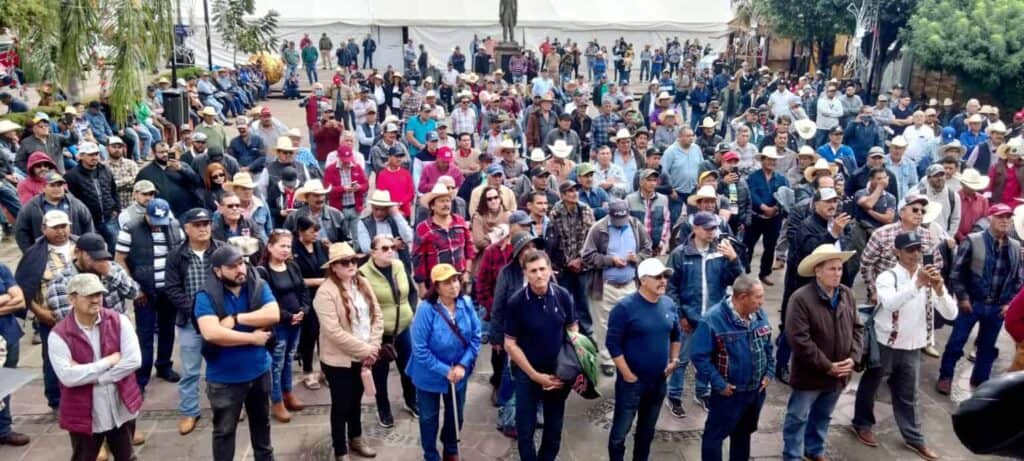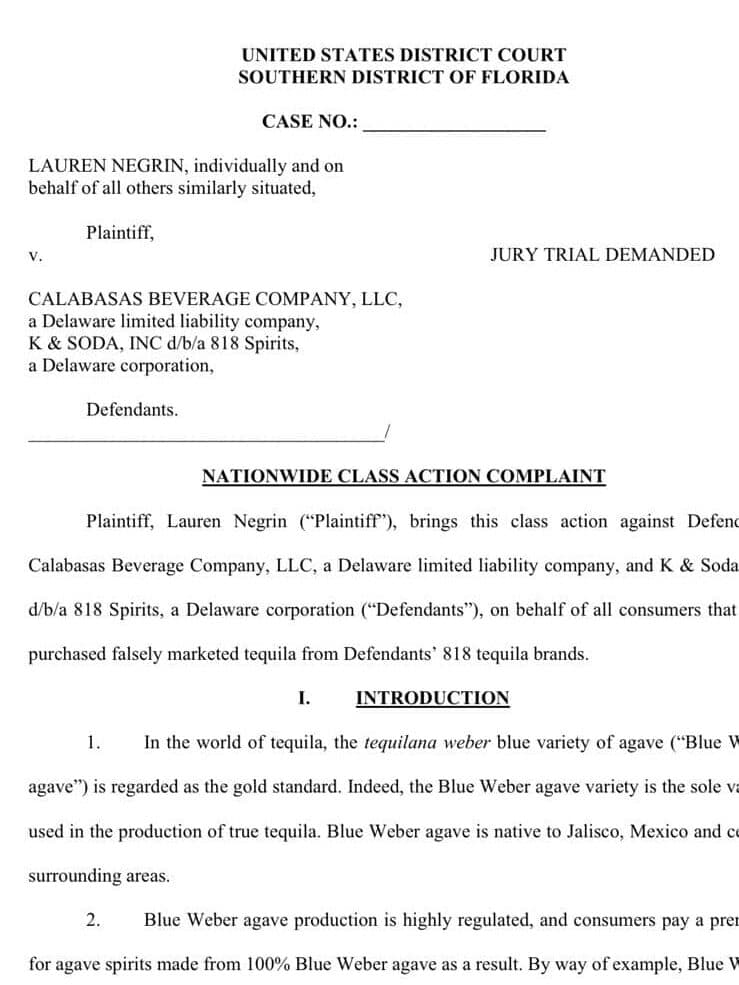Agaveros have called for a criminal investigation of the CRT, and 818 is facing a class action lawsuit. In other words, the tequila adulteration scandal continues to be messy as hell. Felisa Rogers investigates.
Mexico City— At an October 16 press conference, Remberto Galván Cabrera announced that four additional tequila brands have failed the purity test. According to Galván, these major brands are masquerading as premium 100% agave tequila, but are actually adulterated with industrial cane alcohol. He has the lab tests to prove it. And no, he’s not talking about Don Julio, Casamigos, Cincoro, or 818, which have been slapped with class action lawsuits for allegedly selling adulterated tequila in the US.
If you’ve been following this unfolding drama, you may remember that Galván is a spokesperson for agave farmers (currently Agaveros de la Agroindustria del Tequila) who have been protesting industry corruption and unfair practices for over a year.
In September, Galván lodged a formal complaint with the government, demanding a criminal investigation of the CRT, the organization that regulates the tequila industry. The CRT is tasked with ensuring that all tequila meets legal standards, but Galván alleges that the organization is instead profiting from authorizing the sale of adulterated tequila. Galván traveled to the neighboring state of Guanajuato to request the investigation. His home state of Jalisco is the stronghold of the CRT, which influences local politics.
“The CRT certifies a product as 100% agave when it isn’t,” Galván stated, “With these tests, we prove it. The organization acts as a monopoly that favors industrialists, marginalizes small producers, and puts public health at risk.”

The CRT is a nonprofit “interprofessional organization” that supposedly represents all players in the tequila industry–including agave farmers. In October of 2024, a coalition of agaveros challenged this claim. The price of agave had dropped from 32 pesos a kilo (in 2018) to just one peso a kilo, and the farmers had a litany of complaints. They alleged that the drop in prices wasn’t just the same old boom and bust cycle that had plagued agave farmers for years. At a protest outside of CRT headquarters in Zapopan, Jalisco, agaveros sounded the alarm, alleging that the CRT was colluding with major tequila companies to drive down agave prices and squeeze out small farmers.

Curious to know more about the source of this unrest, I sought out Remberto Galván Cabrera. He was loquacious, passionate, and hellbent to expose the alleged corruption. Much of what he said seemed plausible. The idea of corporations colluding to screw over farmers? Sure. The agaveros’ accusation that a regulatory body (the CRT) was corrupt? Certainly possible. His allegation that giant corporations were breaking international laws to adulterate their supposedly premium tequilas? That was harder to swallow. I couldn’t understand why they would take such a giant risk when it would be relatively easy to prove that a tequila was corrupted. Galván assured me there was evidence, but he wasn’t ready to release it. Fast forward about a year…
Since we first broke the story of the allegations in January of 2025, the drama has escalated. Galván was kidnapped and beaten. His phone and paperwork were stolen. Two leaders in the movement, Julián Rodríguez Parra and Salvador Ibarra Landeros, were arrested and jailed. I received veiled threats. The agaveros continued to stage protests.
Casamigos, Don Julio, Cincoro, and 818 accused of selling fake tequila
Although the protesting agaveros were making a lot of noise, the story wasn’t picked up by major news sources until May 5, 2025, when we reported that a class action lawsuit had been filed in New York against liquor giant Diageo. The lawsuit alleges that two Diageo tequilas, Casamigos and Don Julio, were adulterated with industrial alcohol. Diageo refuted the allegations stating, “All Casamigos and Don Julio tequilas labelled as ‘100% agave’ are made from 100% blue weber agave. We will vigorously defend the quality and integrity of our tequilas in court, and against anyone who is spreading misinformation and lies about our products.”
On July 4, another class action lawsuit was filed in California, opening the field of plaintiffs to anyone in the US who had bought Don Julio or Casamigos products. Since then, additional tequila brands have been slapped with lawsuits, including Kendall Jenner’s 818 tequila. In a case filed in Florida, the plaintiffs accuse 818 of knowingly selling adulterated tequila.
According to the September 23 filing, “Defendants actively concealed and misrepresented the true nature of how their Products were manufactured and composition of their Products. Indeed, Defendants concealed and misrepresented that they had in fact utilized sugars other than those obtained from the tequilana weber blue variety of agave to enhance their tequila, despite the Products being labeled as 100% agave azul.”

Agaveros ask Mexico’s president for help
These stories have been unfolding in the US for the past five months. Galván and his cohorts have been trying to gain traction with Mexican authorities for over a year. They have appealed to the governor of Jalisco, the secretary of the economy, and other government entities. In the October 16 press conference, they aimed for the top brass, asking President Claudia Sheinbaum to make good on her campaign promises of “shared prosperity.” They called for her to “end the monopoly orchestrated by the CRT and the tequila industry, which affects the entire agave tequila supply chain and the health of consumers.”
Is it possible to prove that a tequila isn’t 100% agave?
In response to past accusations, we’ve heard a familiar refrain: the test results don’t actually exist or it’s impossible for these tests to verify if a tequila contains alcohol from other sources. To speak very frankly, this is bullshit.
The test results do exist. I’ve seen them–including the names of the latest implicated brands–which are major. The release of these names could impede the nascent official investigation in Mexico or put Galván in danger. We are respecting Galván’s wishes to protect this information for the time being.
The second excuse, that the tests can’t actually determine the percentage of agave sugars in a spirit, is also patently false. A Mexican government agency, The National Center for Metrology (CENAM) has analyzed the testing process and issued an official report confirming that the labs have a valid method for determining the agave content in liquor.
Obviously, protecting the chain of evidence is vital here. Galván says that to ensure transparency, the purchase of the bottles was witnessed by a public broker, who recorded the transactions. Immediately after purchase, the samples were delivered by courier to CIATEC, a federal research center. In short, the bottles never passed through Galván’s hands.
CIATEC analyzed the liquor using gas chromatography and later submitted samples to Eurofins Laboratory in Nantes, France, which is accredited internationally for the SNIF-NMR (Nuclear Magnetic Resonance) method of determining the botanical origins of alcohol.
How does this work? NMR testing identifies the plant origin of ethanol in a spirit by measuring the natural carbon fingerprint. This fingerprint—known as a stable carbon isotope ratio–allows labs to identify the plant source of the sugars used in fermentation. Meaning that the tests can determine what percentage of sugars in a bottle of “tequila” were derived from agave. In the case of 100% agave tequila…well, it should be 100%.
So how bad is the adulterated “tequila”?
“The four samples we analyzed were adulterated with cheap cane alcohol,” Galván says. “Two samples weren’t even recognized as mixto tequila, meaning they have 33% agave sugars or less. The other two barely reached 51% agave.” He notes that one sample also had unsafe levels of methanol–a factor the CRT supposedly monitors.
We contacted the CRT for comment but have not yet received a reply. They have declined our previous request.
The numbers Galván lists are consistent with the test results cited in the California class action lawsuit, which was filed on July 4 by Baron & Budd in conjunction with Hagens Berman, who were responsible for the first class action lawsuit in New York.
According to the legal team, tests revealed that Casamigos Blanco contains approximately 33% agave-derived alcohol. Supposedly, Don Julio Blanco is 42% agave, while their pricey 1942 Añejo contains just 33% agave. As the complaint summarizes, “These findings directly contradict the prominent ‘100% Agave’ labels on Diageo Premium tequila products and confirm that Diageo’s representations are materially false and misleading.”
What’s next?
We are awaiting further promised commentary from Galván, as well as signs of action from Mexican authorities and further developments in the US lawsuits. Stay tuned!






#groverwasright